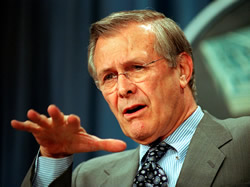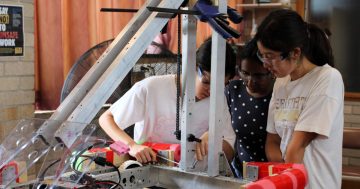Michelle Gibbings* says an official’s evasive answer to a question nearly 20 years ago gives a clue as to how we will have to conduct ourselves in the times ahead.
 When 2020 kicked off with the usual New Year festivities, no one predicted that the year would unfold as it did.
When 2020 kicked off with the usual New Year festivities, no one predicted that the year would unfold as it did.
It was a year of uncertainty, change and thankfully, also hope.
It was also a reminder that, despite great intentions, concrete plans, and strategic foresight, there will always be things you can’t expect.
You can plan for the ‘known knowns’, but it is tough to prepare for the ‘unknown unknowns’.
Back in 2002 at a press briefing, the then United States Secretary of Defence, Donald Rumsfeld (pictured) famously said this:
“There are known knowns. There are things we know we know. We also know there are known unknowns. That is to say, we know there are some things we do not know.
“There are also unknown unknowns, the ones we don’t know we don’t know.”
Like many things in life, the original context in which he made that comment has been forgotten.
For the history buffs, he was trying to evade answering a question about the US’s evidence that Iraq was supplying terrorists with weapons of mass destruction.
Despite the statement’s shady history, it is a useful way to think about how you equip yourself — both personally and professionally — to be ready for whatever life throws at you.
As last year so aptly demonstrated, you can’t engineer uncertainty and change out of life.
When you break it down, three scenarios will eventuate:
Known Knowns
These are issues and events that you can identify, analyse and precisely determine how to best respond in advance.
You will typically have facts and data to help back up your case and approach.
Known Unknowns
These are the issues and events that you know may happen, but you don’t yet have the knowledge, information or process to be able to manage effectively.
Facing this scenario is about questioning, gathering information and learning so you can work out how to best respond.
Unknown and Unknowns
The issues and events that you can’t predict will happen; commonly referred to as Black Swan events.
Being ready for such events isn’t about building the detailed plan; it is much more about your readiness to change, your willingness to respond rapidly and your resilience to see tough times through.
It is building the behavioural and leadership skills so you are adaptable.
As we move further into 2021, being ready for all three scenarios is critical.
As noted historian, Yuval Noah Harari said:
“In order to keep up with the world of 2050, you will need not merely to invent new ideas and products but above all to reinvent yourself over and over again.”
Many of us have had to do that — reinvent and adapt quickly.
Through all of this, there have been multiple opportunities for learning and growth; some of which has been harder than others.
However, it is often in those tough times that you discover the best of who you are, and the best of who the people around you are.
*Michelle Gibbings is a Melbourne-based change leadership and career expert and founder of Change Meridian. She can be contacted at [email protected].
This article first appeared at changemeridian.com.au.











